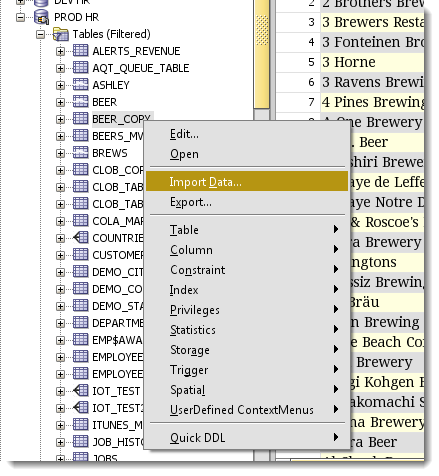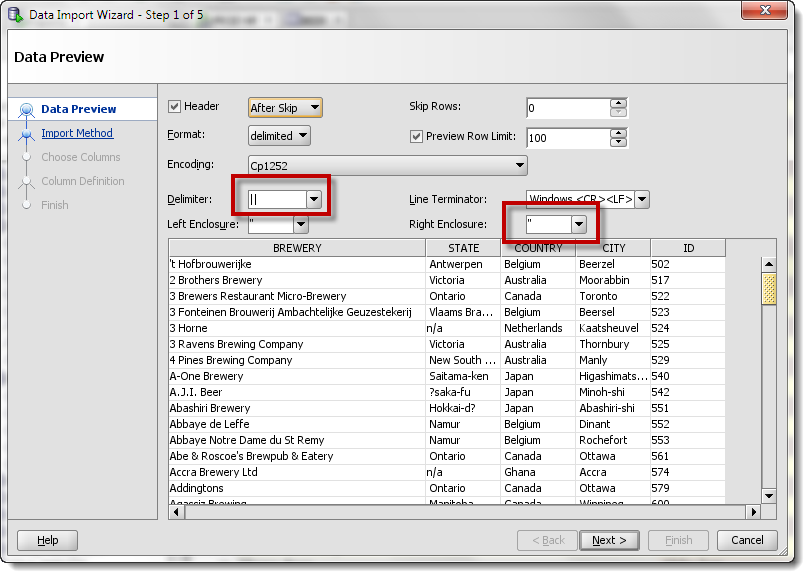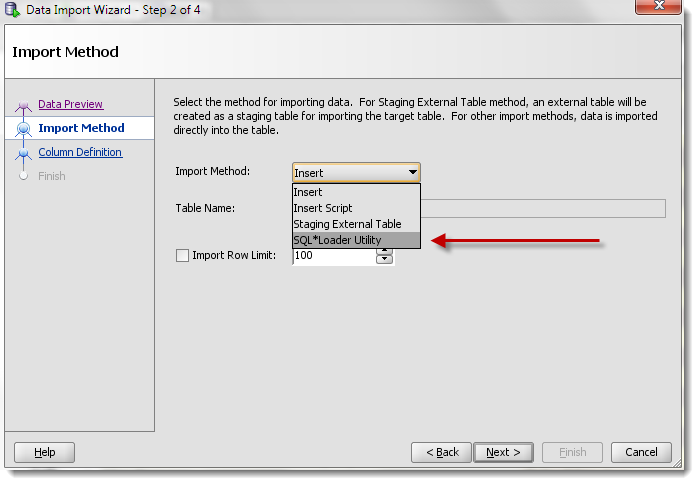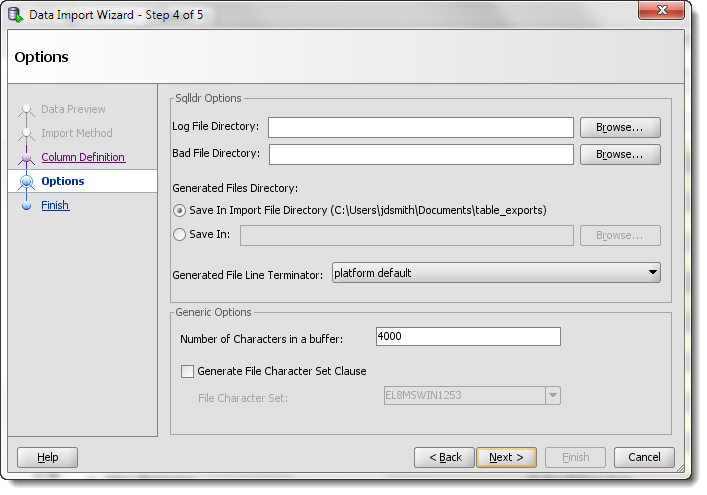There is an easy way to generate SQL Loader control files using SQL Developer Import functionality as described by the post below
Using Oracle SQL Developer to Setup SQL*Loader Runs
I've done a couple of posts on how to use SQL Developer to load your Excel files to an Oracle table. However, I always wonder how many folks realize there may be a 'better way.' If you are loading data to Oracle on a regular basis, there's a few things I want you to know about:
SQL*Loader is a client tool. It runs on your desktop and connects to the database over SQL*Net. It's part of the Oracle Client installation. It reads one or more files, parses the data, and loads it to your tables. A control (CTL) file that defines how the data is to be read does most of the hard work. Actually, you'll do most of the hard work by creating the CTL file. Are my strings single or double-quoted? What delimits a value, commas or pipes perhaps?
I think one of the reasons folks tend to stick with 'the GUI' is that they like running a wizard, answering a few questions, and then hitting 'Go.' I'm guessing you didn't know you could use SQL Developer's Import Data Wizard to look at your data, build the CTL file, and then give you a batch or SH file to execute to kick things off. I'm guessing that because until today, I didn't know either 

Here's what a CTL file can look like
load data
infile 'C:\Users\jdsmith\Documents\table_exports\beer_pipe_delimited2.dsv' "str '\r\n'"
append
into table BEER_COPY
fields terminated by '||'
OPTIONALLY ENCLOSED BY '"' AND '"'
trailing nullcols
( BREWERY CHAR(4000),
STATE CHAR(4000),
COUNTRY CHAR(4000),
CITY CHAR(4000),
ID CHAR(4000)
)
infile 'C:\Users\jdsmith\Documents\table_exports\beer_pipe_delimited2.dsv' "str '\r\n'"
append
into table BEER_COPY
fields terminated by '||'
OPTIONALLY ENCLOSED BY '"' AND '"'
trailing nullcols
( BREWERY CHAR(4000),
STATE CHAR(4000),
COUNTRY CHAR(4000),
CITY CHAR(4000),
ID CHAR(4000)
)
This file was created by SQL Developer. Now the 'beer_pipe_delimited' file was ALSO created by SQL Developer via the Export Wizard. Once I have a pipe-delimited file, what the 'best' way to load that to Oracle?
If you have access to your database server, then I'd say an External Table is probably a good way to go. But, if you're just a 'lowly developer' who can't put stuff on the server and you don't have a SAMBA directory setup, then SQL*Loader is a nice fall-back position.
Building the SQL*Loader Control File
Once you open the Import Data wizard from your table context menu, you'll be asked to supply the file that holds the data to be loaded.
Define the Record and String Delimiters
If you have the settings correct, you should see your records in the grid. If they look 'funny,' stop. Don't pass go. Make sure the Enclosure and Delimiter settings are correct. Otherwise you're going to have some bad data inserted, if it happens to insert at all.
If your data looks kinda 'funny,' then make sure your file Encoding scheme is right. If it's set to Unicode and your file isn't Unicode, you'll know right away you have a problem.
Choose Your Import Method
You'll notice that 'Insert', 'Insert Script,' and 'Staging External Table' are also available. Insert will work just fine, but if you're dealing with a large amount of records, it will take much longer to run than SQL*Loader or using an External Table.
Map the Columns
The wizard defaults to loading the source columns to the target table columns. If they are named differently, you'll just need to map them manually using the dropdown control.
Defining the SQL*Loader Options
You've already done the 'hard' work. Now you just need to tell SQL Developer where to write the CTL and batch script files to. And where you want to log the SQL*Loader session to. And how big to make the buffer and to ID the characterset.
Once you click 'Finish,' you won't find your new records in your table. No, what you'll find are the files you need to start your SQL*Loader session.
The Generated Files
You've already seen what the CTL file looks like. Since I'm on Windows, let's take a look at the generated .BAT file.
[text]
sqlldr CONTROL=beer_pipe_delimited2.ctl LOG=C:\Users\jdsmith\Documents\beer_pipe_delimited2.log BAD=C:\Users\jdsmith\Documents\beer_pipe_delimited2.bad skip=1
[/text]
[text]
sqlldr CONTROL=beer_pipe_delimited2.ctl LOG=C:\Users\jdsmith\Documents\beer_pipe_delimited2.log BAD=C:\Users\jdsmith\Documents\beer_pipe_delimited2.bad skip=1
[/text]
This basically tells Windows to fire up 'sqlldr,' which is the EXE that runs SQL*Loader. It sends the CTL file, tells it where to LOG, where to write failed records to.
Now on my machine, I had a problem. I don't have $ORACLE_SID setup, because Oracle isn't running there. So to get this to work, I needed to put in my connect string. So I modified the file to
Gotta love that password, huh? Of course you can use this batch file or create your own. The expected parameters will show if you run SQLLDR by itself.
SQL*Loader: Release 11.2.0.1.0 – Production on Wed Aug 15 16:52:15 2012
Copyright (c) 1982, 2009, Oracle and/or its affiliates. All rights reserved.
Usage: SQLLDR keyword=value [,keyword=value,…]
Valid Keywords:
userid — ORACLE username/password
control — control file name
log — log file name
bad — bad file name
data — data file name
discard — discard file name
discardmax — number of discards to allow (Default all)
skip — number of logical records to skip (Default 0)
load — number of logical records to load (Default all)
errors — number of errors to allow (Default 50)
rows — number of rows in conventional path bind array or between direct p
ath data saves
(Default: Conventional path 64, Direct path all)
bindsize — size of conventional path bind array in bytes (Default 256000)
silent — suppress messages during run (header,feedback,errors,discards,part
itions)
direct — use direct path (Default FALSE)
parfile — parameter file: name of file that contains parameter specification
s
parallel — do parallel load (Default FALSE)
file — file to allocate extents from
skip_unusable_indexes — disallow/allow unusable indexes or index partitions (D
efault FALSE)
skip_index_maintenance — do not maintain indexes, mark affected indexes as unus
able (Default FALSE)
commit_discontinued — commit loaded rows when load is discontinued (Default FA
LSE)
readsize — size of read buffer (Default 1048576)
external_table — use external table for load; NOT_USED, GENERATE_ONLY, EXECUTE
(Default NOT_USED)
columnarrayrows — number of rows for direct path column array (Default 5000)
streamsize — size of direct path stream buffer in bytes (Default 256000)
multithreading — use multithreading in direct path
resumable — enable or disable resumable for current session (Default FALSE)
resumable_name — text string to help identify resumable statement
resumable_timeout — wait time (in seconds) for RESUMABLE (Default 7200)
date_cache — size (in entries) of date conversion cache (Default 1000)
no_index_errors — abort load on any index errors (Default FALSE)
control — control file name
log — log file name
bad — bad file name
data — data file name
discard — discard file name
discardmax — number of discards to allow (Default all)
skip — number of logical records to skip (Default 0)
load — number of logical records to load (Default all)
errors — number of errors to allow (Default 50)
rows — number of rows in conventional path bind array or between direct p
ath data saves
(Default: Conventional path 64, Direct path all)
bindsize — size of conventional path bind array in bytes (Default 256000)
silent — suppress messages during run (header,feedback,errors,discards,part
itions)
direct — use direct path (Default FALSE)
parfile — parameter file: name of file that contains parameter specification
s
parallel — do parallel load (Default FALSE)
file — file to allocate extents from
skip_unusable_indexes — disallow/allow unusable indexes or index partitions (D
efault FALSE)
skip_index_maintenance — do not maintain indexes, mark affected indexes as unus
able (Default FALSE)
commit_discontinued — commit loaded rows when load is discontinued (Default FA
LSE)
readsize — size of read buffer (Default 1048576)
external_table — use external table for load; NOT_USED, GENERATE_ONLY, EXECUTE
(Default NOT_USED)
columnarrayrows — number of rows for direct path column array (Default 5000)
streamsize — size of direct path stream buffer in bytes (Default 256000)
multithreading — use multithreading in direct path
resumable — enable or disable resumable for current session (Default FALSE)
resumable_name — text string to help identify resumable statement
resumable_timeout — wait time (in seconds) for RESUMABLE (Default 7200)
date_cache — size (in entries) of date conversion cache (Default 1000)
no_index_errors — abort load on any index errors (Default FALSE)
PLEASE NOTE: Command-line parameters may be specified either by
position or by keywords. An example of the former case is 'sqlldr
scott/tiger foo'; an example of the latter is 'sqlldr control=foo
userid=scott/tiger'. One may specify parameters by position before
but not after parameters specified by keywords. For example,
'sqlldr scott/tiger control=foo logfile=log' is allowed, but
'sqlldr scott/tiger control=foo log' is not, even though the
position of the parameter 'log' is correct.
position or by keywords. An example of the former case is 'sqlldr
scott/tiger foo'; an example of the latter is 'sqlldr control=foo
userid=scott/tiger'. One may specify parameters by position before
but not after parameters specified by keywords. For example,
'sqlldr scott/tiger control=foo logfile=log' is allowed, but
'sqlldr scott/tiger control=foo log' is not, even though the
position of the parameter 'log' is correct.
The Output
Ok, so I have my batch file ready to go. I just double-click on it, Windows launches SQL*Loader and I sit back and watch! But it's a very short show. It takes less than 2 seconds for Oracle to load the almost 12,000 beer records.
Table BEER_COPY:
11955 Rows successfully loaded.
0 Rows not loaded due to data errors.
0 Rows not loaded because all WHEN clauses were failed.
0 Rows not loaded because all fields were null.
Space allocated for bind array: 240120 bytes(12 rows)
Read buffer bytes: 1048576
Read buffer bytes: 1048576
Total logical records skipped: 1
Total logical records read: 11955
Total logical records rejected: 0
Total logical records discarded: 0
Total logical records read: 11955
Total logical records rejected: 0
Total logical records discarded: 0
Run began on Wed Aug 15 16:55:38 2012
Run ended on Wed Aug 15 16:55:40 2012
Run ended on Wed Aug 15 16:55:40 2012
Elapsed time was: 00:00:01.79
CPU time was: 00:00:00.31
CPU time was: 00:00:00.31
This is a good bit faster than loading my data via the Excel importer, which is the same as doing a bunch of straight INSERTS. If you want to know why this is faster, we can go back to the docs.
A conventional path load executes SQL INSERT statements to populate tables. In contrast, a direct path load eliminates much of the database overhead by formatting data blocks and writing them directly to the database files. Direct writes operate on blocks above the high water mark and write directly to disk, bypassing the database buffer cache. Direct reads read directly from disk into the PGA, again bypassing the buffer cache.





Comments
Post a Comment